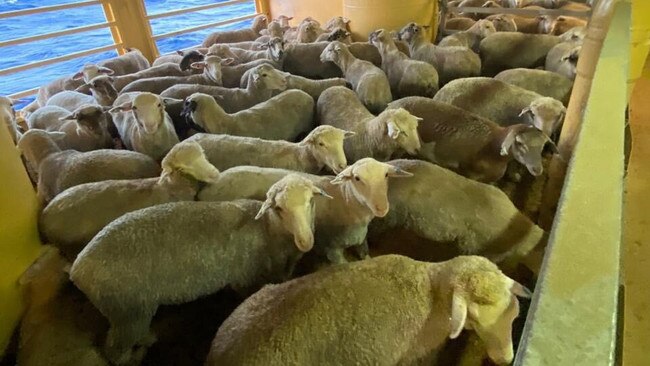Stranded sheep set to resume journey to Middle East
Sheep stranded off the Australian coast are expected to resume their journey to the Middle East after it was delayed by Houthi attacks on shipping lanes in the Red Sea.

About 15,000 sheep aboard a live export vessel that turned back over concerns about Houthi rebel attacks in the Red Sea are expected to resume their journey via the southern cape of Africa.
The MV Bahija docked at the Port of Fremantle on Thursday to unload some of the sheep on-board and reload fresh fodder for the onward journey, which was on Thursday afternoon still awaiting final approval from the Australian Department of Agriculture, Fisheries and Forestry.
The livestock carrier spent three days stuck off the Western Australian coast because of a dispute between the Israeli exporter and the department over the travel route.
Veterinarians sent aboard the ship by the department on Wednesday night confirmed the sheep on-board were in good health.
But regulations stipulated the stocking density of the vessel would need to be decreased because of the longer voyage, which could take up to 60 days, necessitating the unloading of some of the sheep. Because they had entered international waters, potentially exposing them to diseases, the offloaded sheep would be required to spend time in quarantine in Western Australia.
The exact number of sheep on-board has not been disclosed, but industry sources put the figure at about 15,000 and said there were also a small number of cattle on-board.
“On 31 January, two veterinarians engaged by the department boarded the vessel to provide additional assurance on the health and welfare of the livestock on board,” the department said in a statement.
“The report from those veterinarians indicates no signs of significant health, welfare or environmental condition concerns with the livestock on board, consistent with all reports received to date.”
The department said that it was assessing the application to re-export the livestock “as a matter of priority”.
The MV Bahija left Fremantle on January 5 and was en route to the Middle East when the department ordered its return to Australia after it diverted its course because of Houthi rebel attacks in the Red Sea.
The RSPCA and other groups opposed to live exports have called for the sheep to be unloaded immediately and processed in Australia.
Livestock export industry groups criticised activists for spreading false information about the situation and the state of the sheep and called on the government to quickly resolve the issue.
Australia’s chief veterinary officer Beth Cookson said the preliminary report provided by two independent veterinarians identified “no significant animal health or welfare issues” and that the animals on-board were “in good condition and have appropriate care and supervision”.
“It also confirmed that there were no signs of exotic disease present in the livestock on board the vessel,” Dr Cookson said.
The Australian live sheep export industry has been arguing against the government’s promised ban of the trade, which is primarily based in WA. The government is yet to announce a date for a “phase-out”, but said it would not be in the current term.




To join the conversation, please log in. Don't have an account? Register
Join the conversation, you are commenting as Logout